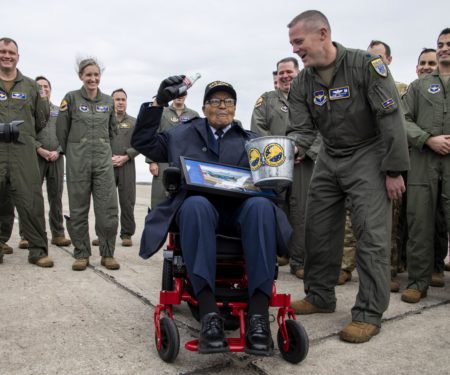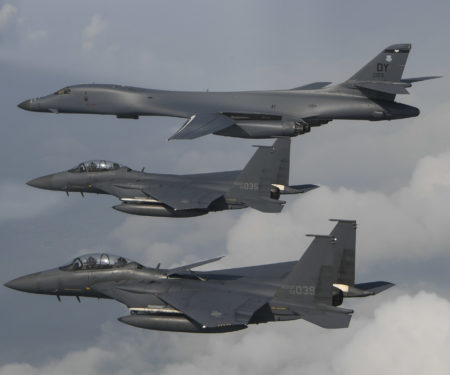Radar Sweep
Five Ways Lawmakers Smacked Down Biden’s Pentagon Plans
Defense policy legislation that’s headed to President Joe Biden’s desk will earn the commander in chief’s signature, but he’s not going to like it. The National Defense Authorization Act, which outlines military spending and policy priorities each year, will force the administration to roll back a requirement that troops get vaccinated against COVID, a provision on which Biden’s Republican detractors have already declared victory.
Space Strategies, Ops, and Tech Go into Hyperdrive: 5 Stories from 2022
Even on a relatively minuscule scale, cislunar space—the vast reaches between the orbits of the Earth and the Moon that space operators all around the world are itching to exploit—involves a distance of some 500,000 kilometers, and more importantly because spacecraft do not travel in a straight line, a volume of around 2 million kilometers, according to Air Force Research Laboratory’s 2021 primer on the region. And just like in 2021, there were way too many stories this year in Breaking Defense’s little corner of the Universe to be able to come up with a list of the five most consequential.
Geospatial-intelligence Agency to Expand Capacity Amid ‘Data Deluge’
The National Geospatial-Intelligence Agency expects to field an expanded delivery capability as soon as fiscal 2024 to better handle a “deluge” of data, according to NGA Director Vice Admiral Frank Whitworth. The agency, which processes and analyzes satellite imagery for the U.S. intelligence community, is developing the Joint Regional Edge Node, or JREN, to give more users access to the information, Whitworth said last week at the Department of Defense Intelligence Information System Worldwide Conference in San Antonio, Texas.
Lawmakers Omit R&D Tax Break From 2023 Spending Bill
Congress has failed to pass much-expected legislation that would have allowed companies to write off research-and-development expenses on their annual taxes. That was the rule from 1954 to 2020, but companies can no longer deduct R&D expenses, a change that cost big defense firms an estimated $5 billion last year. Defense execs asked lawmakers to restore the tax break, but the 2023 omnibus spending bill unveiled on Dec. 20 contains no such provision.
Major Congressional Probe into Afghanistan Withdrawal Gearing Up
The new year will see a new Congress, and one of the first orders of business for Republicans is to investigate the Biden administration for how it handled the U.S. withdrawal from Afghanistan—an operation that saw a suicide bombing, and with it, the deaths of 13 U.S. service members and over 100 Afghans in its final few days.
How DOD’s Own Budget Process Keeps the Military on the Wrong Side of the ‘Valley of Death’
In fiscal year 1956, the Army didn’t ask Congress for a single dollar in its procurement budget. It didn’t need to. Back then, DoD’s budget accounts were apportioned in incredibly broad lump sums, and the dollars didn’t expire. So the Army could simply use $5 billion in unspent funds left over from the Korean War for all of its equipping needs that year. Fast-forward 65 years, and each military service’s budget is made up of hundreds of different line items, each narrowed down into the range of tens of millions of dollars. Each “program element” is planned at least two years in advance, the funds vanish if they’re not used as scheduled, and only about 1 percent of the budget can be reprioritized during the year it’s actually being expended.
GAO: CYBERCOM and Services Not on Same Page Tracking Personnel
Gaps exist in how the military services and U.S. Cyber Command track personnel, potentially leading to staffing issues, according to a new Government Accountability Office report. The report, commissioned by Congress as part of last year’s annual defense authorization bill, notes that the services use a different model for tracking personnel than CYBERCOM.
The Air Force’s Top Enlisted Leader Wants to ‘Take Away the Stigma’ of Beard Waivers
Airmen who need to grow out their facial hair in uniform can take heart that the top enlisted Airman, Chief Master Sgt. of the Air Force JoAnne Bass, wants to reduce the branch’s cultural bias against shaving waivers granted for medical or religious reasons. “We are working to take away the stigma attached to airmen who have a medical need or a religious accommodation for facial hair,” Bass wrote in a comment on her Facebook page on Dec. 20.
Japan Flies Its RQ-4 Global Hawk for the First Time
The Japanese Air Self-Defense Force, or JASDF, has officially flown the first of its new RQ-4B Global Hawk surveillance drones that the country started the process of procuring from the United States in 2015. The high-altitude, long-endurance, or HALE, unmanned aerial vehicle is expected to strengthen Japan’s surveillance capabilities as the country explores ways to enhance its situational awareness and better deter and respond to attacks from outside forces like North Korea and China.
This Air Force Vet Is Rowing 3,500 Miles to Support Veterans with PTSD
Row three hours, rest three hours. Row three hours, rest three hours. That is the current daily routine of Robert Hamilton Owens, a 71-year-old Air Force veteran who, alongside a crew of 11 others, is spending 40 days rowing approximately 3,500 miles across the Atlantic Ocean.



